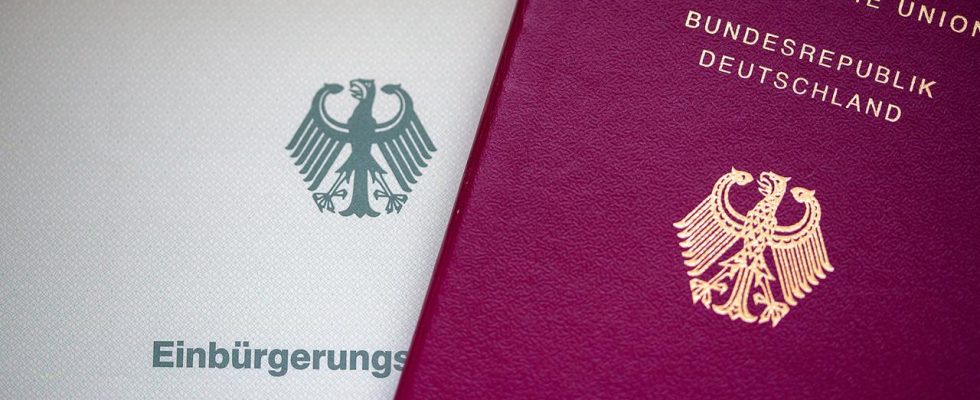The deadlines for naturalization should be shortened – that’s a topic in the cabinet today. It should be easier for some people to get German citizenship. But others fall through the cracks.
Inas Sharif came to Germany with her son six years ago – as part of family reunification. Today the Syrian lives separately from her husband. She is a single parent. She would like to be naturalized in Germany. For her and her son would citizenship means security, she says. “We wish that we can stay here and that we are not afraid that we will be sent back at some point.”
A planned reform of nationality law, which the traffic light coalition had already undertaken in the coalition agreement, should actually make it possible for Sharif to naturalize more quickly – but at one point it could become a problem for her.
The federal government intends to adopt the bill today. He suits him ARD Capital Studio before. According to this, in the future naturalization should generally be possible after five years – instead of the previous eight years. With special integration achievements and advanced language skills even after three years instead of the previous six.
backup of subsistence
But there is a catch: securing your own livelihood was and should continue to be a prerequisite for naturalization. As a rule, anyone who receives money from the state should not be naturalized. At this point, nationality law could become stricter than before.
That could become a problem for Sharif. At the moment she is retraining to become a socio-educational assistant and is dependent on state support. This could remain the case in the future. Because her son is autistic and needs a lot of care. A full-time job is not possible for her at the moment.
So far, there has been an exception for all those who are “not responsible” for using state services. This could include, for example, someone not being able to find a job because of a disability. In the past, however, authorities and courts interpreted the regulation with varying degrees of severity.
Specific exceptions
Now the passage is to be deleted entirely and instead specific exceptions are named – for example for so-called guest workers who came to work in the Federal Republic of Germany in the 1950s to 1970s, and for so-called contract workers who came to the GDR up to 1990. There should also be an exception for people who do not earn their living alone but work full-time and have done so for at least 20 months within the last 24 months – and for parents who live with their child and another full-time working parent .
This wording was not included in the first draft of the Federal Ministry of the Interior. It was only added in a second version, which the SPD Minister Nancy Faeser presented in May together with her colleague from the FDP, Federal Justice Minister Marco Buschmann. The thought behind it: Anyone who is naturalized must be “economically integrated”.
Not covered by the planned list of exceptions are, for example, single parents who cannot work or can only work part-time to look after their children, caring relatives, people with disabilities and, last but not least, trainees and students. The “passtunsallen” alliance, Diakonie Germany and Pro Asyl had sharply criticized this. The draft law, which is now due to go through the cabinet, expressly names the problem in the justification and points out that these people can be naturalized via a hardship regulation “if they have done everything objectively possible and subjectively reasonable to secure their livelihood permanently”.
This is a so-called discretionary naturalization according to Section 8 of the Nationality Act. According to this provision, there is no entitlement to naturalization; it is rather at the discretion of the authorities. In practice, for example, professional athletes who are to be included in a national team are currently benefiting from this.
multiple citizenship and less language certificates
There should be another change on a very fundamental point: the requirement that you have to give up your previous citizenship should be removed. In practice, it is already the case today that multiple citizenship is the rule and not the exception for naturalized persons. The rate has been increasing for years, in 2022 it was 74 percent. This is due to extensive exceptions, for example for all nationals of EU member states and Switzerland – or if giving up nationality is not possible or only possible under particularly difficult conditions. According to the Federal Statistical Office, 99.9 percent of Syrians retained their Syrian citizenship last year.
There should also be simplifications in proving language skills. For members of the guest worker generation, it should be sufficient if they can communicate in everyday life without any problems.
With the reform, the federal government wants to make foreigners who live permanently in Germany a “significantly more attractive offer” for acquiring German citizenship than before. She hopes that this will provide an incentive for “rapid integration”. Citizenship comes with rights and responsibilities. In particular, full political participation such as participation in federal elections is only possible with a German passport.
According to the Federal Statistical Office, the naturalization rate last year was 3.1 percent of the foreign population who had been living in Germany for at least ten years – slightly higher than in previous years. A particularly large number of Syrians who have come since 2015 have been naturalized. Inas Sharif would also like to be one of the naturalized soon: “I think five years is enough to be honest. If we do our best, if we integrate, if we learn the German language.”
The Federal Ministry of the Interior wants to check by 2028 whether the changes have led to a higher naturalization rate. In a next step, however, the draft law must first be discussed and approved by the Bundestag.

